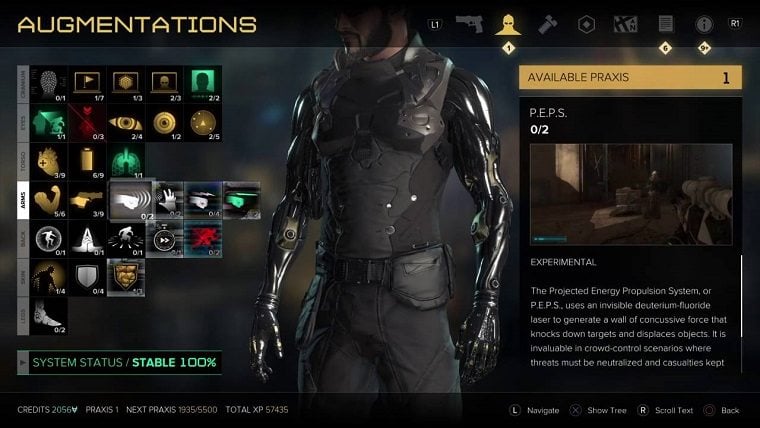The other cyberpunk game
Cyberpunk 2077 launched to great fanfare and...frustration at its myriad bugs and shoddy current-gen console ports. But all is not lost for those who lack a true gaming PC - there is in fact another cyberpunk game that, judging from its sales, you probably haven't played. And it's good!
Deus Ex: Mankind Divided (2017) is the fourth major release in the venerable series, and a direct sequel to 2011's Human Revolution. The graphics are obviously better, but the gameplay is more or less the same. You play as Adam Jensen, an augmented agent for the United Nations. Your task: to uncover the person or group responsible for a major terrorist attack - and stop them before the strike again.
Mankind Divided takes place in the near future, 2 years after the events of Human Revolution. The world is socially divided into two categories: humans and the augmented, or "augs," who are cybernetically-enhanced humans. You may recall that anti-aug prejudice plays a major role in Human Revolution; now it's far worse - after all, the terrorist attack was essentially a virus that took over people's augmentations and led them to commit violence against the un-augmented. Despite the fact that this was not a conscious decision or choice on the part of the augmented, fear and mistrust has grown exponentially. The result is a form of apartheid, where augs are crowded into ghettos and subject to intense scrutiny and repression by security forces.
The game is very clearly trying to evoke both the experience of Jews under the earlier phases of Nazism and that of black South Africans under the white Apartheid regime, as well as other recent examples of the same thing. There are no massacres - yet - but there is wholesale repression and mistreatment. The choice of Prague as setting is key here, with the augmented ghetto aptly named "Golem City."
Within this context, Jensen has to uncover the clues as to who committed the atrocity. Early signs point to the radical Augmented Rights Coalition, or an even more radical splinter of the ARC. But this being a Deus Ex game, you know the real perpetrators are the ones pulling strings from the shadows. The conspiracy angle isn't terrible interesting or well-realized - no surprise there - so it's thankful the game does pretty much everything else well.
Gameplay is, as I mentioned before, largely unchanged from Human Revolution (though there are a few tweaks). You can decide whether to go with a combat/lethal or a stealth/non-lethal approach. You can also combine the two, though there are specific achievements associated with either and by committing to one it allows for greater deployability. I went with stealth/non-lethal, because that's always my preference in games that have well-developed stealth mechanics. As you level up, you can choose the augmentations that best suit your purposes. I focused on hacking, cloaking and sound suppression first, then branched off into other areas as the game progressed. A combat-focused build could start with armor enhancements, inventory expansion and better targeting.
Overall I found the stealth mechanics to be very good, though not quite as developed as, say, the Splinter Cell series. The AI is solid - the game is hard but not cheap. And while there certainly was a degree of trial-and-error, I never found the game frustrating or tedious. Nearly all problems have multiple solutions; nearly all destinations can be reached multiple ways. The hacking minigame is also surprisingly enjoyable, the kind of thing that would translate well as a mobile game. And I do really like how Eidos Montreal integrated RPG elements into this framework. It's much smoother than, say, Mass Effect: Andromeda. Augmentation progression has a good pace, and you loot just the right amount of items. Oh, and shops actually sell stuff that's worth buying!
This is also a game where choices matter, including choices made in conversation. Certain outcomes are only possible if you make the right choices, while others are only possible if you have the social augmentation and use it correctly. I was a bit "meh" on this - in theory, it's great, but in practice the social augmentation is clunky, non-intuitive and poorly explained. So if you want to unlock everything, you probably need to consult a walkthrough. Or play the game twice.
The best part of Mankind Divided, though, is Prague. This is not a true open world, like in Witcher 3 or Fallout, but a semi-linear/semi-open world, like in Witcher 2 or the Mass Effect series. So don't expect to get truly lost. But the Prague that Eidos Montreal has created is beautiful, easily navigated and immersive. Twice you leave and come back, only to find the context changed significantly. And Prague isn't a place normally associated with cyberpunk (like Hong Kong, Tokyo or New York), so there's a novelty element to it as well. It's interesting to see futurism juxtaposed against the old buildings.
The story is both here and there. Thematically, it's rich and well-realized...it's just that some of the actual plot points don't make a lot of sense. And the whole "illuminati" conspiracy angle, which was so much fun with the original Deus Ex, now feels equal parts tired and, given current events, more than a touch irresponsible. Luckily Mankind Divided focuses more on the game's social themes, which as noted above are thought provoking.
All in all this is a very good game, and criminally underrated. Especially recommended for fans of stealth - a genre that's fallen on hard times lately, it seems - and those who like their games smart.
The Math
Baseline Assessment: 8/10
Bonuses: +1 for grappling with big ideas, mostly successfully; +1 for strong and varied gameplay mechanics; +1 for mood and design
Penalties: -1 for big gaping plot holes; -1 it feels shorter than it should be
Nerd Coefficient: 9/10. "Very high quality/standout in its category."
***
POSTED BY: The G--purveyor of nerdliness, genre fanatic and Nerds of a Feather founder/administrator, since 2012.




